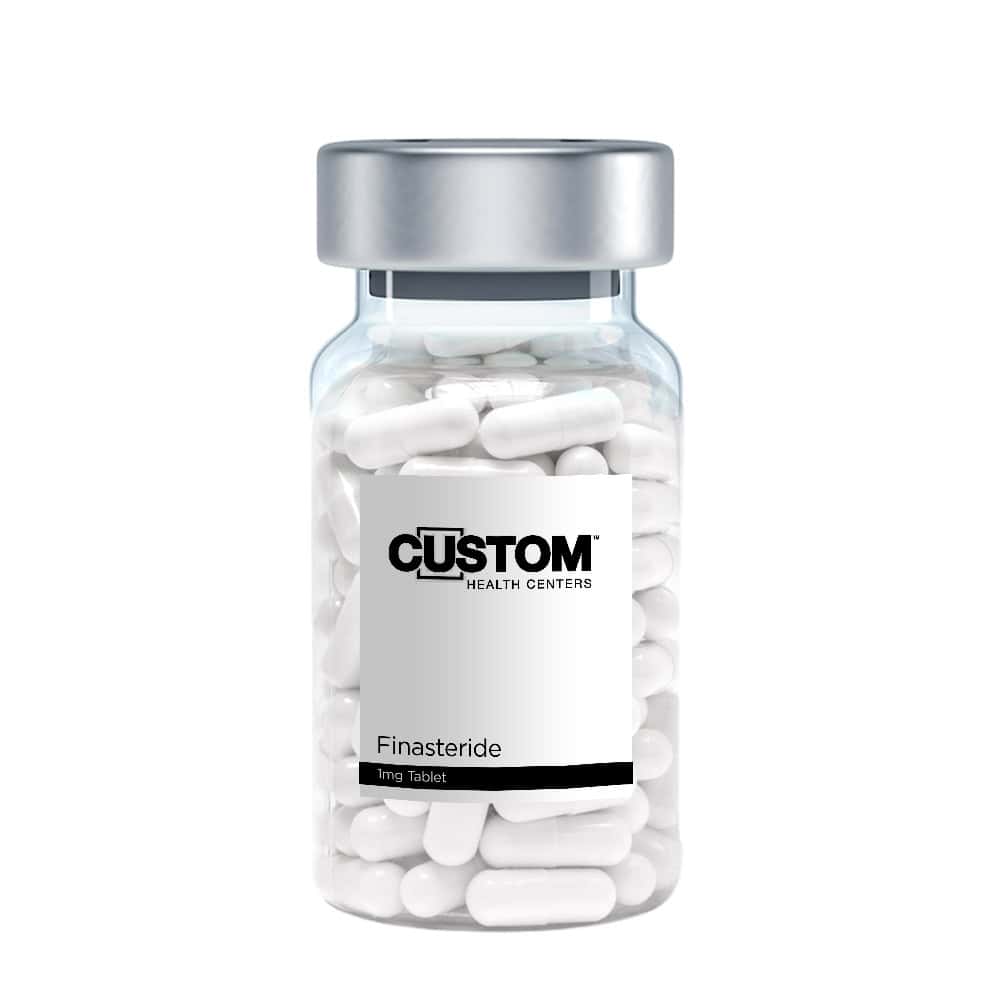
Finasteride
Finasteride is a medication used to treat male pattern baldness and benign prostatic hyperplasia (BPH) by inhibiting the conversion of testosterone to dihydrotestosterone (DHT).
Features/Benefits:
- Hair Growth: Effectively helps hair loss and promotes regrowth in men with male pattern baldness.
- Prostate Health: May help symptoms of BPH, such as difficulty in urination.
- Hormonal Balance: Lowers DHT levels, addressing the root cause of hair loss and prostate enlargement.
- Convenient Dosing: Available in once-daily oral tablets.
- Proven Results: Clinically proven to show significant improvements in hair density and prostate health.
What is it?
Finasteride is a prescription medication commonly used to treat male pattern baldness and benign prostatic hyperplasia (BPH). It works by inhibiting the enzyme 5-alpha-reductase, which is responsible for converting testosterone into dihydrotestosterone (DHT). By reducing DHT levels, Finasteride helps to slow hair loss and promote hair regrowth in individuals experiencing androgenetic alopecia (male pattern baldness). Additionally, it helps symptoms of BPH, such as frequent urination and difficulty in urination, by shrinking the enlarged prostate and promoting urinary flow. With its dual-action benefits, Finasteride may offer a solution for men seeking to manage hair loss and prostate health, contributing to confidence and quality of life.
Recommended Use: Take as directed by a healthcare provider for optimal results.
Frequently Asked Questions
Finasteride tablets are prescribed to address male pattern hair loss, characterized by gradual thinning of scalp hair, particularly evident as a receding hairline or balding on the crown of the head in men. However, it’s essential to note that finasteride is not effective for all types of hair loss, such as telogen effluvium or tinea capitis. Additionally, at higher doses, finasteride is used to treat an enlarged prostate gland, commonly referred to as benign prostatic hyperplasia (BPH), under the brand name Proscar®.
Prescription finasteride works by preventing testosterone from breaking down into DHT, the hormone that is thought to contribute to male pattern baldness (aka androgenic alopecia) in genetically predisposed men. Finasteride medication is known as a 5-alpha reductase inhibitor.
Insurance is not required to access our services and products. The cost of treatments may vary, but CHC aims to provide affordable and accessible solutions to customers without the need for insurance coverage.
Absolutely! We understand how life can change in an instant. There are no long-term contracts or cancellation fees here. You have the flexibility to cancel before your next prescription is submitted, about 10 days before your next payment.
To complete a consultation with Custom Health Centers, simply fill out our brief online medical questionnaire. Our medical team, based in the United States, will evaluate your responses to determine your suitability for treatment and the most appropriate medication for your needs.
Yes, we use plain packaging without any identifying labels or logos.
If you are eligible for treatment, our Medical Team will issue you a prescription. You do not need an outside prescription to work with us.
- are pregnant or may become pregnant. Finasteride may harm your unborn baby.
- Finasteride tablets are coated and will prevent contact with the medicine during handling, as long as the tablets are not broken or crushed. Females who are pregnant or who may become pregnant should not come in contact with broken or crushed finasteride tablets.
- If a pregnant woman comes in contact with crushed or broken finasteride tablets, wash the contact area right away with soap and water. If a woman who is pregnant comes into contact with the active ingredient in finasteride, a healthcare provider should be consulted. If a woman who is pregnant with a male baby swallows or comes in contact with the medicine in finasteride, the male baby may be born with sex organs that are not normal.
- are allergic to any of the ingredients in finasteride.
- have any other medical conditions, including problems with your prostate or liver.
- Take finasteride exactly as your healthcare provider tells you to take it.
- You may take finasteride with or without food.
- If you forget to take finasteride, do not take an extra tablet. Just take the next tablet as usual.
- Decreased libido 1.8%
- Erectile dysfunction 1.3%
- Decreased volume of ejaculate 1.2%
A literature review shows there may be evidence of increased depressive symptoms in individuals younger than age 45 while using finasteride for hair loss. Patients with new or worsening depression should stop finasteride use and follow up with their health care provider or a mental health therapist. Source
- Allergic reactions including: rash, itching, hives and swelling of the lips, tongue, throat, and face
- Testicular pain
- Male infertility and/or poor quality of semen
- In rare cases, male breast cancer
- breast tenderness and enlargement. Tell your healthcare provider about any changes in your breasts such as lumps, pain or nipple discharge.
- decrease in sex drive that continued after stopping the medication.
- allergic reactions including rash, itching, hives and swelling of the lips, tongue, throat, and face.
- problems with ejaculation that continued after stopping medication.
- testicular pain.
- difficulty in achieving an erection that continued after stopping the medication.
- male infertility and/or poor quality of semen.
- in rare cases, male breast cancer.
Depression: A literature review shows there may be evidence of increased depressive symptoms in users younger than age 45 while using finasteride for hair loss. Patients with new or worsening depression should stop finasteride use and follow up with their health care provider or a mental health therapist.
- Store finasteride at room temperature between 59˚F to 86˚F (15˚C to 30˚C).
- Keep finasteride in a closed container and keep finasteride tablets dry (protect from moisture).
Initial dosage
At Custom Health Center, the initial dosage is set by doctors based on your health profile, ensuring personalized and safe treatment.
Continued Care
Over time, you work with a dedicated Care Practitioner to make sure you are seeing results, and if not, we shift to find what is right for you
Simple price
Unlike other clinics, Custom Health Center keeps dosing costs affordable—making it more simple with no hidden fees.

Customer Testimonials
The statement has not been evaluated by FDA. The product is not intended to "diagnose, treat, cure or prevent any disease."
FINALLY—
Easy, affordable treatments that can make a difference.
And the Custom Health Center team is here to guide you every step of the way.
Our goal is to make your journey successful, cost-effective, and as easy as possible.
You’re not in this alone.

Blogs
The statement has not been evaluated by FDA. The product is not intended to "diagnose, treat, cure or prevent any disease."


